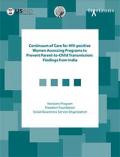Publications - Released in 2007
In India, 38.4 percent of the estimated 5.1 million HIV infections are among women (UNAIDS/WHO 2006). Although mother-to-child transmission (MTCT) accounts for a little less than 4 percent of all HIV infections in India, in sheer numbers it is the cause of approximately 56,700 children infected with HIV each year (IAP/NACO 2006, UNICEF 2006). With support from UNICEF, India’s national program for prevention of parent-to-child transmission (PPTCT) of HIV has been underway since 2002. More recently, the government launched a national treatment program that offers antiretroviral therapy (ART) to HIV-positive women, children below 15 years of age, and men. However, since the start-up of the ART program there have been concerns about access to and utilization of these services by women and children. To address these concerns, a comprehensive PPTCT initiative that emphasizes treatment for HIV-positive women and their children was launched in 2004 by the National AIDS Control Organization (NACO) using funds from the Global Fund to Fight AIDS, Tuberculosis, and Malaria. To better implement this initiative, it is imperative to understand the prevention and care needs of the women who are receiving or have received PPTCT services, referral systems between PPTCT programs and other HIV-related and reproductive health services, and linkages between PPTCT programs and community-based organizations and NGOs.
Downloads
Organizations
- United States Agency for International Development (USAID)
- Population Council






